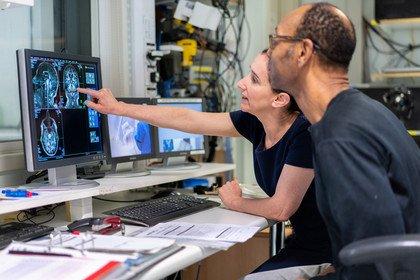
EPIC: studying epistemic injustice in healthcare
How can we ensure that people are heard in healthcare settings? Professor Havi Carel’s discovery research project is bringing together philosophy, legal scholarship, psychology and more to help provide an answer.

Jack Cole / Wellcome
When you visit your healthcare provider, do you feel heard?
What factors might affect your experience of healthcare systems and the clinical care you receive?
As a philosopher of medicine, I’m interested in the experience, or phenomenology, of illness.
I’m also interested in the concept of epistemic injustice and how this impacts healthcare users and professionals.
This is the topic of my Wellcome-funded Discovery Award project – EPIC: Epistemic injustice in healthcare.
What is epistemic injustice?
Epistemic injustice is a philosophical concept which describes how we can be discriminated against when our credibility is unfairly reduced when we speak. The result is an injustice of a specific kind: an epistemic injustice.
This might be because you are from a particular ethnic group, or because you are a woman. It could be because of how you dress or your socioeconomic status or because you’re a child.
It's an injustice done to somebody in their capacity as a speaker, as a knower – when someone is providing information about themselves, presenting their views, offering an opinion and so on. This is what we call 'testimony' in philosophy.
This can have very serious consequences.
Epistemic injustice in healthcare
Epistemic injustice can be encountered in any number of contexts, but it can be particularly prevalent and also particularly harmful in healthcare settings.
Healthcare users provide information all the time; How are you feeling? Where does it hurt? How long have you had this symptom?
If they are disbelieved, it can have dire consequences for the quality of clinical care they receive.
One of the starkest examples is during childbirth. A woman might say she’s in pain but will be told in response that the pain can’t be that bad – it's just natural. Or stereotypes about how different ethnic groups might experience pain will affect how a clinician responds.
Not being believed can lead to harmful outcomes for an ill person when their symptoms aren’t taken seriously. It can lead to worse clinical care.
These are just some of the many ways epistemic injustice can play out in healthcare, and why healthcare users and providers alike need support in navigating this tricky terrain.
Pressing play on the video above will set a third-party cookie. Please read our cookie policy for more information.
Maybe we can’t cure people or entirely remove symptoms, but we do have the ability to give people the sense that they're being listened to and that their opinions and needs are being taken seriously.
I'm Havi Carel, I'm the principal investigator on a discovery award called EPIC which is epistemic injustice in healthcare.
Epistemic injustice
it's a philosophical concept developed in order to capture the way in which we can be discriminated against when our credibility is unfairly reduced when we speak. Because you are from this ethnic group, or because you are a woman, or because of how you dress or because of your socioeconomic status.
So it's an injustice done to somebody in their capacity as a speaker, as a knower. And of course, It's particularly significant within healthcare because these contributions from patients are sometimes overlooked or ignored or not acted upon.
And this, of course, could have dire consequences for the quality of the clinical care that they receive.
The EPIC team includes researchers from philosophy, psychiatry, psychology, law, history, and qualitative health research.
The project aims to identify, describe, document, analyse and ultimately ameliorate the phenomenon of epistemic injustice in healthcare.
So EPIC will address four existing problems in the field.
The first is it's conceptually under described and what EPIC will do is fill theoretical gaps in our understanding of epistemic injustice in healthcare.
Second, it's empirically untested, and this will be the first large scale project to use six case studies to describe and understand and document epistemic injustice in real healthcare domains.
The third is that EPIC will develop some amelioration and ways to address and reduce the risk of epistemic injustice in healthcare.
And finally, EPIC will try and bring the concept of epistemic injustice into contact with the broader healthcare discourse.
For me, the most important outcome of the project would be to develop concrete and applicable tools for both health professionals and patients to reduce epistemic injustice within healthcare.
How can research help?
EPIC is the first research project to look systematically at epistemic injustice across several domains within healthcare and to document empirical evidence of it.
There are a number of things we can do with this evidence. Firstly, we can make sure the theoretical concept of epistemic injustice works in this context. Does it need updating or changing?
Then we want to generate material that can benefit patients and healthcare professionals.
This could be in the form of collaborative work. For example, we have started a collaboration with the Care Quality Commission trying to assist them in finding ways of overcoming epistemic injustice when reviewing patient complaints and reports.
Some of the materials we develop will help healthcare professionals become aware of and mitigate the effects of epistemic injustice.
We also want to create a toolkit for patients which will help them understand what epistemic injustice is and give them tools to overcome it in their own health journeys.
There’s currently very little research on practical approaches to addressing epistemic injustice, so EPIC can fill this crucial knowledge gap.
Maybe we can’t cure people or entirely remove symptoms, but we do have the ability to give people the sense that they're being listened to and that their opinions and needs are being taken seriously.
Tracking epistemic injustice across lifespans
Part of the EPIC project is focussed on six case studies, historical and contemporary, of real-life experiences at different points across a lifespan.
These case studies will help us test the validity of the concept of epistemic injustice by exposing it to very different empirical contexts and theoretical approaches.
Epistemic injustice case studies
Birth experiences of women from different ethnic groups.
A law case study review led by Professor Sheelagh McGuinness at the University of Bristol.
A historical case study of migrant communities and the BCG vaccination for tuberculosis.
Led by Dr Michael Bresalier, a lecturer of History of Medicine at Swansea University.
Experiences of young people with psychosis symptoms.
Qualitative research and conversational analsys, led by Professor of Philosophy Lisa Borlotti and and Professor of Psychiatry Matthew Broome of the University of Birmingham.
Experiences of people with cancer.
Qualitative health research led by Professor Lisa Borlotti and partners from Bologna and Ferrara, Italy.
Experiences of people with depression.
Qualitative health research led by Professor Lisa Borlotti and partners from Bologna and Ferrara, Italy.
Experiences of people with dementia.
Qualitative health research led by Professor Lisa Borlotti and partners from Bologna and Ferrara, Italy.
Drawing on such a varied range of case studies means the EPIC team is equally varied.
We’ll be using approaches from medical history, legal scholarship, philosophy, medical anthropology, psychiatry, and psychology. We have psychiatrists, psychologists, conversation analysts and more on the team, all contributing to the research.
Having a team like this, made up of a mix of medical, social, history of medicine and philosophy specialists is, I think, a recipe for very interesting research.
Why the humanities are crucial for healthcare research
We often think of science and medicine as constantly innovating and creating new things, but medicine has a long history to be considered.
In healthcare research, you need both the science and the empirical evidence – the expertise in epidemiology for example. But you also need to consider the conceptual questions and the historical and sociological context.
Healthcare research is both an art and a science, especially when dealing with clinical settings. It's high time the silos of science versus social science or arts and humanities were taken apart. It's a good model for universities to adopt and it’s good to see it from Wellcome, too.


